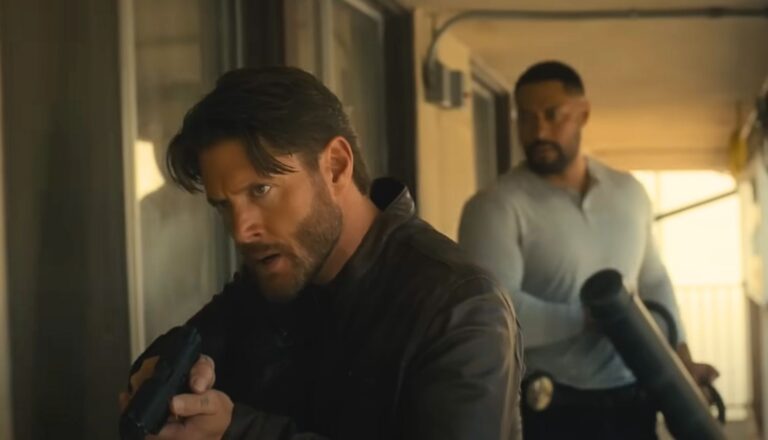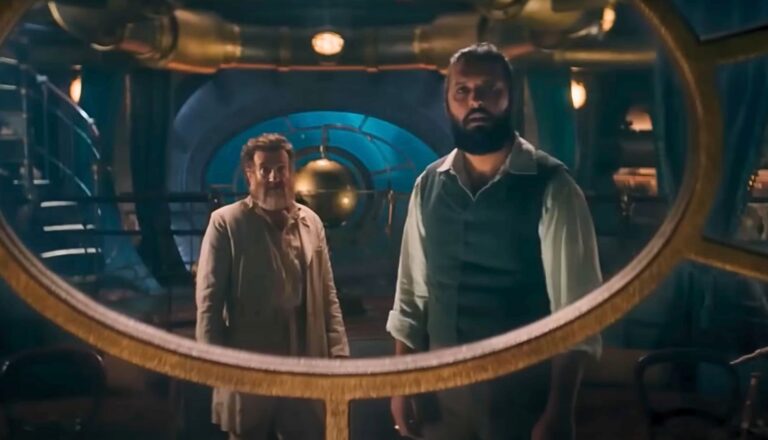
Smoke
Where there’s smoke, there’s going to be fire. And where there’s Apple TV’s ‘Smoke,’ there’s going to be content issues.

All Melissa Reed ever wanted in life was a normal family.
She started off strongly with a mom, a dad, a brother and a sister. They’d take camping trips together, going hiking, fishing, roasting marshmallows. You know, just like any other family.
But then Melissa’s parents got divorced. And they didn’t tell their kids why. Melissa’s mom, June, moved with her children into her parents’ house. Melissa and her siblings slept on cots in the basement. Newly single June did everything she could to make ends meet. But then the hammer really came down.
Melissa’s dad, Keith, got arrested.
“What for?” her brother asked. “For murder,” June answered.
Keith Hunter Jesperson, it turns out, was the Happy Face Killer, a serial murderer who confessed to strangling eight women in the ’90s. (And that part of this miniseries is true.)
That confession completely shattered Melissa’s world.
Suddenly, everything Keith had ever done for Melissa had new meaning. The trinkets he’d bring her after a long trip away from home usually belonged to his victims. His obsession with murder mystery novels? Not so much a quaint hobby as it was an instruction manual on how not to get caught.
But Keith was eventually caught after he killed his girlfriend. And his confession about that killing and seven other women’s murders led to a lifelong prison sentence without parole.
Melissa has seen her dad twice since then. Both times ended badly, since she couldn’t reconcile the loving man who had raised her with the unremorseful killer sitting behind bars. Unfortunately, that hasn’t stopped Keith from reaching out.
Keith has been writing letters to Melissa for the past 20 years or so. Melissa has never responded. In fact, she’s never ever read the letters, believing them to be the delusional ramblings of a madman. But Keith is employing new tactics now. If Melissa won’t come visit him, perhaps her children will.
Of course, Melissa’s kids don’t even know who Keith is. In her efforts to finally attain that “normal” family, she and her husband, Ben, told their kids that Melissa’s dad died when she was 15—the same year Keith went to prison. And as far as they’re concerned, there’s no reason for anyone to believe anything different.
Keith isn’t one to be ignored, though. If Melissa won’t talk to him, he’ll make her talk. So, he puts in a call to Melissa’s boss (who is unaware of Melissa’s familial connections), a popular TV psychologist named Dr. Greg.
I have a ninth victim, Keith tells Dr. Greg. But I’ll only tell Melissa who it is.
Now Melissa has a choice to make: If she agrees to see her dad, it will open up old wounds and potentially expose her own kids to trauma, too. But if she refuses, an innocent man could receive the death penalty for a murder committed by the Happy Face Killer.
Happy Face is a new miniseries streaming on Paramount+ based on a true story. The show is part murder mystery, part true crime examination. And there’s a lot to unpack here.
First, Happy Face deals in murder. Although nothing is depicted onscreen (as of the first two episodes), Keith describes in great detail how he killed one victim. And we hear many other characters report how he raped and strangled each of his victims before disposing of their bodies.
Language is harsh, too, with multiple uses of the f-word, among other profanities.
But perhaps what parents may most want to consider is how this show treats fans of true crime. True crime is in. There are countless podcasts, TV shows (including this one) and other forms of entertainment that examine the topic. So when Melissa’s 15-year-old daughter, Hazel, learns who her grandfather is, she uses that information to gain popularity at school.
But Melissa has a very different experience. Whereas Hazel never met her grandfather, Melissa had to watch a man she loved dearly turn into a monster before her very eyes. And unlike Hazel’s crime-obsessed peers, Melissa’s classmates responded violently, beating her up.
As an adult, Melissa continues to hide her parentage—and perhaps understandably so—because she’s not sure how people will respond. A prison guard threatens her with sexual assault, for instance, wondering if she’s as “sick” as her old man. One of her colleagues alludes to women who fall in love with serial killers after reading about them in the paper. We learn people have obsessively bought Keith’s art online. And Keith manipulates the situation with Melissa to gain even more notoriety and press.
If there’s one thing Happy Face gets right, it’s that there are still very real victims who deserve justice. They include Keith’s ninth victim, the man who was wrongfully accused of that victim’s murder, and even Melissa herself. She desperately wants to do the right thing but is impeded by the trauma she’s suffered.
So while Happy Face capitalizes on the nation’s obsession with true crime—which may very well make this show a nonstarter for most families—at least it remembers that there are people out there who have been hurt by this craze.
(Editor’s Note: Plugged In is rarely able to watch every episode of a given series for review. As such, there’s always a chance that you might see a problem that we didn’t. If you notice content that you feel should be included in our review, send us an email at [email protected], or contact us via Facebook or Instagram, and be sure to let us know the episode number, title and season so that we can check it out.)
We hear some gruesome details about the crimes committed by Keith Jesperson, which including choking, beatings and sexual assault. Most of his victims died by strangulation. Keith goes into great detail describing one woman’s murder in particular.
A woman is interviewed about her daughter’s murder, which has gone unsolved. We hear that five out of six Americans will become victim to a violent crime in their lives. Melissa verbally threatens to make her dad’s life miserable after he contacts her children without permission. As a child, Melissa watches news about murder with her dad, upsetting her mom. A woman justifies her career in true crime, stating that she’s more interested in what drives a person to murder than she is in the violent act itself. As a teenager, Melissa sees blood on her dad’s ceiling fan but accepts his explanation that it’s actually spaghetti sauce.
Melissa’s mom says that even after Keith was arrested, he had people who watched their family and threatened her. And she warns Melissa that he might come after her, too, if she doesn’t comply with his wishes. We learn that the man who was convicted for the murder of Keith’s ninth victim is on death row. So if Melissa can prove that Keith was guilty, this man will be set free and Keith will face the death penalty instead.
A prison guard verbally threatens Melissa with sexual assault. Keith denies raping his victims (though he admits having sex with them), but police evidence says otherwise. He brags that it was easy to kidnap his victims because they let down their guard after seeing pictures of his daughters.
Keith sends a drawing to Melissa’s daughter of a mermaid with watermelons covering the breasts. We hear that some of his victims were prostitutes (though he denies ever paying for sex). We see a shirtless man. Melissa kisses her husband.
The producer of Dr. Greg’s show employs coercion to get the emotional responses she’s manipulatively trying to elicit. And she sometimes forces her employees, including Melissa, to help in this manipulation. Keith manipulates Melissa and her boss to get the results he wants. Keith shows no remorse for his actions, and it seems this is because he doesn’t think he’s a bad person.
People lie. Melissa’s stepdad is a little rude to her. We hear that Melissa’s mom struggled to provide for her three children after her divorce. She and Melissa have a strained relationship, since she was emotionally distant after Keith was arrested.
A few of Keith’s letters have the words “Find God here” written next to a drawing of a cross. When Melissa is a child, Keith gives her a stone, telling her it represents “Father Sky” and grants protection and enduring love.
Melissa drinks heavily after visiting her dad in prison, and her producer joins her.
There are more than a dozen uses of the f-word and eight uses of the s-word. God’s name is abused five times, and there’s a single instance of “h—.”
Melissa ultimately agrees to visit her dad in the hope that she can provide some answers to the family of her father’s alleged ninth victim. She also hopes it will help keep her children safe from further contact with him. Her husband discourages this visit, however, since he’s worried about her mental health. Melissa admits that although she can’t forgive him for his crimes, she still loves her dad, which is part of the reason why she’s so adversely affected by him. But different people help her to realize that she is not responsible for what Keith did.
We hear a woman’s job is to help women and children get off the streets and into safe housing.


Emily studied film and writing when she was in college. And when she isn’t being way too competitive while playing board games, she enjoys food, sleep, and geeking out with her husband indulging in their “nerdoms,” which is the collective fan cultures of everything they love, such as Star Wars, Star Trek, Stargate and Lord of the Rings.

Where there’s smoke, there’s going to be fire. And where there’s Apple TV’s ‘Smoke,’ there’s going to be content issues.

In Prime’s Countdown, Nathan Blythe assembles a task force of misfits to investigate and halt a conspiracy that puts all of Los Angeles in jeopardy.

While none of the elements within this reimagining of Jules Verne’s famous book are particularly gruesome, they can be intense.

Scrublands’ Martin Scarsden is good at uncovering buried secrets, even when the secrets put his own life—and others’—at risk.